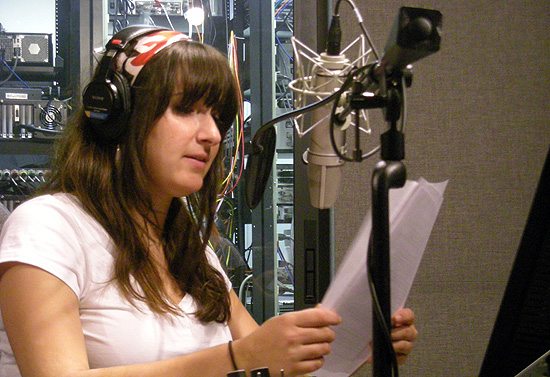Argus Editor Writes, Produces Stories for National Public Radio
 |
| Andrea Domanick 10 participated in a National Public Radio internship this summer working on the program All Things Considered. |
| Posted 09/04/08 |
Shes already produced a story about Muslim voters role in the upcoming election and reported on gender identity at some of Baltimores most colorful ballroom events. But this is only the beginning for Wesleyan student Andrea Domanick 10, who plans to pursue a career in broadcast journalism post Wesleyan.
 As a summer intern for National Public Radio, Domanick worked for All Things Considered, NPRs signature afternoon newscast that reaches 11.5 million listeners weekly. She was one of 55 college students and recent graduates to participate in an internship program, held June 2 to Aug. 9 at the NPR headquarters in Washington, DC. As a summer intern for National Public Radio, Domanick worked for All Things Considered, NPRs signature afternoon newscast that reaches 11.5 million listeners weekly. She was one of 55 college students and recent graduates to participate in an internship program, held June 2 to Aug. 9 at the NPR headquarters in Washington, DC.
Ive been a fan of NPR since I was very young, so with my interest in journalism, applying for an intern position with NPR seemed like a natural choice, says Domanick, who was selected from a pool of more than 1,000 applicants. Having the opportunity to produce solid pieces of journalism on relevant topics was incredibly rewarding. Student interns learn about broadcasting and the supporting areas of NPR through hands-on, practical experience. Interns are mentored by NPR reporters, editors, producers and engineers throughout the process. They learn how to pitch story ideas, record sound, write scripts and edit their final pieces for the program. Aside from interning with All Things Considered, Domanick participated in Intern Edition a 40-minute web-based radio show produced entirely by NPRs interns. The show, which is part of NPRs Next Generation Radio Initiative, premiered July 31. For Intern Edition, Domanick and fellow intern Carina Giamerese co-developed a piece on Baltimore’s ballroom scene to combine their interests in subcultures and alternative lifestyles. “Putting the story together was absolutely a team effort; though its my voice you hear on the piece, and my writing, Carina helped me edit my script, record and conduct interviews and edit our sound, not to mention do some of the driving on our three treks out to Baltimore, she says. Thats how producer/reporter teams work. Project Manager Doug Mitchell says the intern program aims to provide direct training in public radio journalism and program development: Shows come and go, news comes and goes. We want people who will consider staying in the public radio system, he says. Learning all aspects of the business, with lots of trial and error, is the best way to find people committed to public radio. Los Angeles, Calif. resident Domanick had her first journalism gig at the age of 13, when she wrote for a local paper called L.A. Youth. At Wesleyan, she joined The Wesleyan Argus staff, working her way up from a staff writer, to assistant arts editor, to arts editor to news editor. Shes also a staff writer for the music website, TinyMixTapes.com. “I enjoy being at the crux of campus life and interests,” Domanick says. “Because there isnt any academic or monetary incentive to be on the Argus staff, you have a very close-knit group of people who are interested in putting out a great paper for the sake of putting out a great paper. So because of this environment, and because its a small paper, Ive really been able to find my voice as a journalist.” After several years of working in print journalism, Domanick decided to give broadcast journalism a try. Last summer, she interned with NPR member station KPCC in Los Angeles, reporting and producing her own pieces. She found herself getting hooked on the added creative element of using sound. Radio is not just writing, its crafting a whole scenea feel and an environmentfor your listeners,” she says. “And the thought and vision you have to put into creating a good radio piece is so effective, so satisfying to me,” she says. Domanick, a sociology major at Wesleyan, plans to go to graduate school for broadcast journalism. Ultimately, she hopes to work at NPR as a foreign correspondent or producer. “Both positions demand very different things, but are equally exciting to me. I love the crafting, and technical, almost artistic, skill required of being a producer,” she says. “On the other hand, whats more exciting than reporting from the heart of storytwo or three continents away?” |
| By Olivia Drake, The Wesleyan Connection editor. Photos contributed by NPR. |

